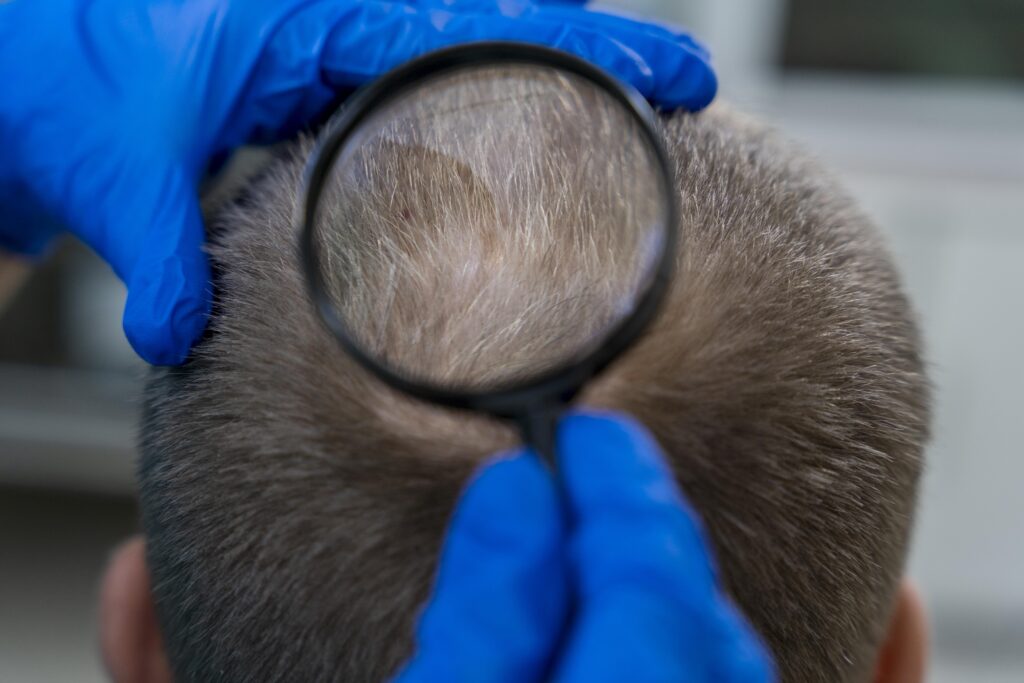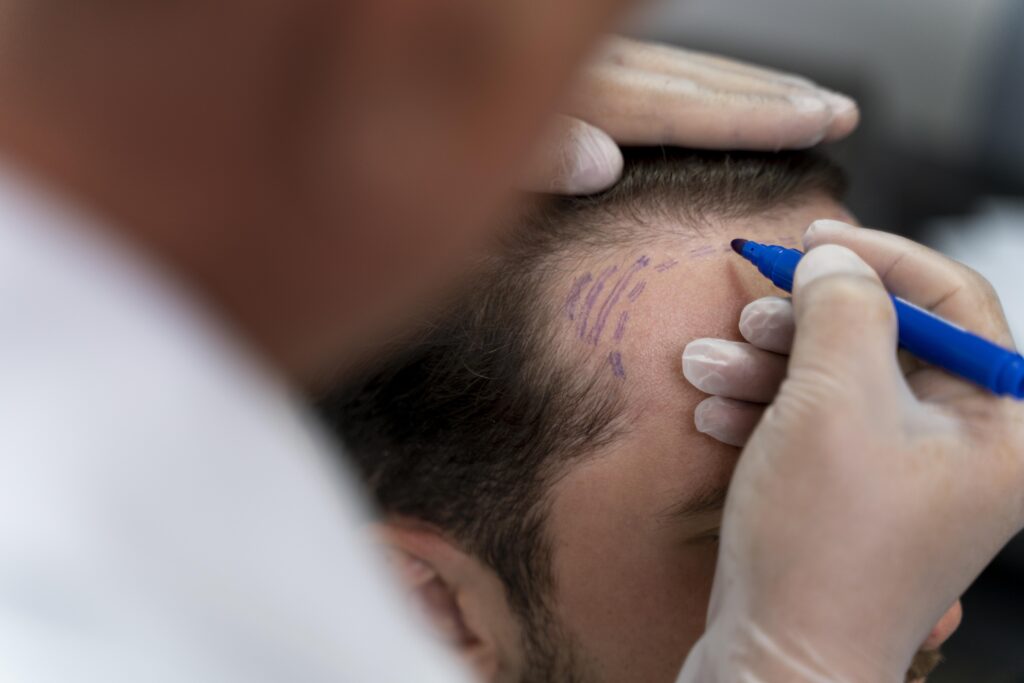Why Is My Hair Falling Out? Whether it’s gradual thinning at the temples or sudden shedding in the shower, male hair loss is a common concern.
In this guide, we explain why your hair might be falling out, what causes it, and how you can stop or reverse the process.
Understanding the reasons behind male hair loss can help you take the right steps early — whether that’s seeing a specialist, starting treatment, or simply changing your routine.
Read on to learn how to protect your hair and regain your confidence.
Why Is My Hair Falling Out? Understanding Male Hair Loss
What Does “Hair Falling Out” Really Mean?
“Hair falling out” in men can refer to:
- Shedding: When more hair than usual is found on your pillow or in the shower.
- Thinning: When your hair becomes less dense, especially at the crown or temples.
- Bald Patches: Sudden hair loss in round patches (common in alopecia areata).
These symptoms can be temporary or signs of a progressing condition like male pattern baldness (androgenetic alopecia).
Common Causes of Hair Loss in Men
1. Genetics: The #1 Culprit
The most frequent cause of male hair loss is androgenetic alopecia, also known as male pattern baldness. This hereditary condition typically begins with:
- A receding hairline
- Thinning at the crown
- Eventual formation of an M-shaped pattern

2. Stress and Lifestyle Factors
Stressful events or chronic anxiety can lead to telogen effluvium, a condition that pushes hair prematurely into the shedding phase. Contributing factors include:
- Job or relationship stress
- Crash diets or poor nutrition
- Irregular sleep cycles
Pro Tip: If you’ve noticed increased hair fall 2–3 months after a stressful event, telogen effluvium may be the cause, and it’s often reversible.
3. Medical Conditions and Hormonal Imbalances
Certain health conditions can also trigger hair loss:
- Thyroid disorders
- Anemia (iron deficiency)
- Diabetes
- Autoimmune diseases like alopecia areata
4. Medications and Treatments
Hair loss can be a side effect of:
- Chemotherapy
- Blood pressure medications
- Antidepressants
- Steroids
Always consult a healthcare provider if you notice hair fall after starting a new medication.
Is It Normal to Lose Hair Every Day?
Yes — losing 50 to 100 hairs a day is part of the normal hair growth cycle. But if you’re seeing:
- More than 150 hairs daily
- Sudden clumps falling out
- Visible scalp patches
When to Worry About Hair Loss
Seek help if you notice:
- Rapid hair thinning
- Patchy hair loss
- Itching, redness, or flaking scalp
- Family history of baldness starting in early adulthood
Early diagnosis can slow or reverse many types of hair loss.
Diagnosis: How Doctors Identify the Cause
When you visit a hair specialist or dermatologist, they may perform:
- Scalp Examination: To check for inflammation or infection.
- Pull Test: To measure hair shedding severity.
- Blood Tests: To detect nutritional or hormonal imbalances.
- Trichoscopy: A magnified look at hair shafts and follicles.
Effective Treatments for Hair Loss in Men
1. Topical and Oral Medications
- Minoxidil (Rogaine): Over-the-counter topical solution to slow hair loss and stimulate regrowth.
- Finasteride (Propecia): Prescription pill that blocks DHT, a hormone linked to hair loss.
2. Advanced Clinical Treatments
- PRP Therapy (Platelet-Rich Plasma): Injections that boost hair follicle health using your blood.
- Laser Therapy: Low-level lasers stimulate growth at the follicle level.
3. Hair Transplant Surgery
When hair loss becomes advanced, surgical options like FUE (Follicular Unit Extraction) can provide a permanent solution.

Expert Tips to Prevent Further Hair Loss
- Eat a balanced diet rich in protein, iron, and vitamins.
- Avoid tight hairstyles like ponytails or man buns.
- Use mild, sulfate-free shampoos and avoid over-washing.
- Manage stress through sleep, exercise, and mindfulness.
- Consult a doctor early if you have a family history.
FAQs About Hair Falling Out in Men
Q: Can hair loss be reversed in men?
A: Yes, especially if caught early. Treatments like minoxidil, finasteride, PRP, and lifestyle changes can help stop or reverse some types of hair loss.
Q: Is hair loss at 25 normal?
A: Hair loss can begin as early as your 20s, especially if there’s a genetic predisposition. It’s important to act early to preserve existing hair.
Q: How do I know if it’s temporary or permanent?
A: Temporary hair loss often follows stress or illness and affects the whole scalp. Permanent loss usually shows patterns like a receding hairline.
Q: Should I see a dermatologist or hair specialist?
A: Yes, especially if you’re unsure of the cause. A proper diagnosis is essential for effective treatment.
Take Action: Protect Your Hair Today
If you’re experiencing hair falling out as a man, don’t wait until it’s too late. Early diagnosis and intervention can make all the difference.
Whether it’s starting medication, improving your diet, or exploring advanced treatments like PRP or FUE, help is available.
Book a consultation with Dr. Rana Irfan (ABHRS, ISHRS) in Islamabad today — and take the first step toward restoring your hair and confidence.
